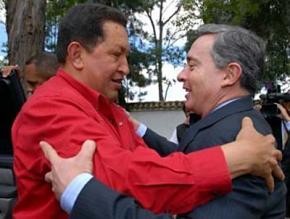Aftermath of the Colombian “rescue”
analyzes the backdrop to the meeting between two rival leaders in Latin America.
ÍNGRID BETANCOURT'S rescue from Colombian rebels on July 2, along with three American military contractors and 11 other Colombians, has led to some unexpected political developments in the region--including a friendly summit meeting between two rivals, Colombia's right-wing President Álvaro Uribe and Venezuela's Hugo Chávez.
Although the details remain murky, the Colombian military's successful operation to free the former Green Party presidential candidate from the Revolutionary Armed Forces of Colombia (FARC) after six years of captivity constituted a major victory for the government and exposed a deep crisis in the morale and fighting capacity of the FARC guerrillas, who have been locked in a decades-long civil war with the regime.
But the daring rescue described in such glowing terms by the Western media now appears to bear the signs of a set-up--confirming suspicions raised by the fact that Republican presidential nominee John McCain turned up in Colombia for a visit as the hostage release was taking place.

According to the FARC in a written statement, their own local commanders are "traitors" who voluntarily handed over the hostages. But there is speculation in Latin America that the military fooled the FARC commanders by putting Colombian and International Red Cross symbols on their clothing and the side of their helicopter--in violation of international law.
Meanwhile, in a move that surprised many of his supporters, Hugo Chávez took the opportunity of Betancourt's liberation to mend relations with Uribe.
Although he has often been accused by the American and Colombian governments of aiding the FARC, Chávez spoke out following the hostage release to advise the FARC that the "epoch of the rifle has passed"--and to reach out to Uribe. "We said very hard things, that's what happens between brothers sometimes," Chávez said on July 4, referring to past confrontations between the two. "[But] it has passed and, I hope, it has passed forever."
The July 11 summit between the two presidents featured lots of smiles and handshakes for the cameras, as well as discussions of multi-million-dollar joint ventures involving the two countries.
Chávez's kind words for Uribe are a dramatic reversal and raise serious questions about how the left-wing government in Venezuela will relate to the U.S.-backed regime on its border--a country with a long record of human rights abuses committed by its military and the paramilitary death squads associated with it.
This has provoked a debate among supporters of the Venezuelan revolutionary process about Chávez's motives and what it means for the direction of his government. As the Colombian daily El Mundo speculated, by meeting with Uribe, "Chávez strengthens a weak flank [to his right] in the tough electoral battle coming up in November against an opposition that is every day stronger and more cohesive."
Chávez's electoral calculations aside, Ecuador's left-wing President Rafael Correa has thus far refused to go along with the new diplomatic turn. On March 1, Colombia raided Ecuadorian territory, killing the FARC's number-two commander, then on a diplomatic mission to discuss hostage releases with the French government. Last weekend, Correa reiterated that his government would not restore ties as long as there was "no decent government" in Colombia.
AMID ALL this, one thing that is clear is that the U.S. government, after a period of relative retreat, is preparing to reassert its economic and military might against the region's left-leaning governments.
The U.S. Navy's Fourth Fleet has been conducting exercises off Venezuela's coast this summer, and Congress and President Bush just approved $500 million for Plan Merida, aimed at beefing up the Mexican military under the guise, like Plan Colombia, of fighting the "war on drugs."
Since Plan Colombia was initiated by Bill Clinton, the Colombian military has gotten hundreds of millions of dollars of aid every year. This avalanche of arms has made the Colombian military one of the most powerful in the region--far more so than the Venezuelan military, for instance--and turned the tide in the civil war.
While the turn to the left in Latin America over the past number of years cannot be reversed by mere threats from the North alone, the danger is real for the coming years--and as Uruguayan journalist Raul Zibechi pointed out, the possible victory of Barack Obama in the U.S. presidential election doesn't change that.
"It might temper the most authoritarian aspects of Uribe-ism, which explains the unease of the government in Bogotá and their hoped-for alliance with the Republican candidate [John McCain]," Zibechi wrote. "What is certain is that the plans of the Southern Command [of the U.S. military] do not depend on the tenant in the White House. They plan to promote integrated action in the region that converts it into a stable zone and an impregnable bulwark to maintain American hegemony on a global scale.
"In sum, the imperial elites plan to use the force of arms to reverse their decline, and this means re-colonization for Latin America. In a period such as this one, only mass mobilization of the people and political means can contribute to weakening the offensive coming from the North."


